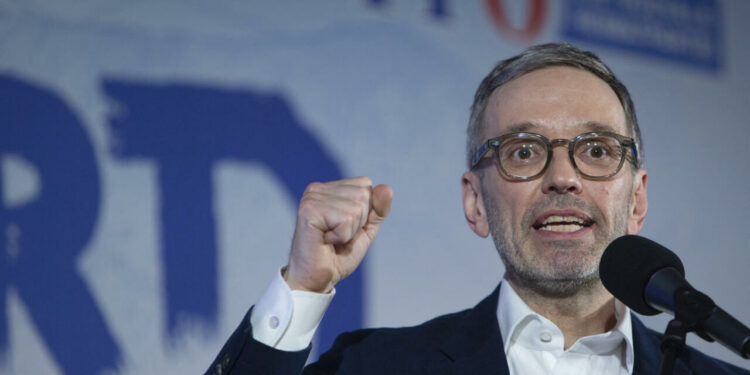Read moreAlarm over Austria far-right party video as its support soars
According to Biard, this coalition was one of the first examples of “a new phase in the development of the extreme right in Europe since World War II” in which parties are no longer content “to act as major opposition forces, but have ambitions to reach the seat of power in order to exert a direct influence on public policy”.
So although the FPO experienced internal divisions and electoral setbacks, it again returned to the heart of Austrian political life in 2017, joining the government formed by the OVP’s Sebastian Kurz. This new experience of power was once again short-lived, this time due to the “Ibiza-gate” corruption scandal that forced former FPO leader Heinz-Christian Strache to step down as vice-chancellor in 2019.
The impact of Ibiza-gate nevertheless had a limited effect on the party, believes Biard. In the last European elections of 2019, the FPO, despite losing ground, remained the third-largest party with 17.2% of the vote.
“The dissatifaction of its electorate – or a segment of it – does not seem to have been borne out over the long term,” says Biard.
Despite a new scandal linked to the FPO, accused by the ruling Greens party this month of enabling Russian espionage, the party “is probably holding up well”, says Biard.
One explanation for the FPO’s ability to weather scandal “lies in the fact that far-right parties have traditionally taken to presenting themselves as victims of the system as a whole” and are adept at using victimhood as a way of deflecting critics, Biard explains.
Capitalising on people’s frustrations
In addition to this anti-system rhetoric, the FPO’s other major themes are typical of far-right parties: the rejection of immigration, the defence of a form of Austrian “patriotism”, a very hardline stance on Islam and an emphasis on Eurosceptic rhetoric.
As with most far-right parties, while FPO voters are motivated by ideology they also vote “to express their dissatisfaction with, or even disenchantment with, the way democracy works today”, says Biard.
In a recent interview with the Austrian news agency APA, Vilimsky, lead candidate of the FPO’s EU parliament list, stated that his party’s mission was to “kick the establishment in the butt”.
In a study published in April, Patrick Moreau, a political scientist specialising in contemporary Germany and Austria, cited some of the reasons for the FPO’s leading position in the polls, notably the impeachment of former chancellor Sebastian Kurz and other People’s Party corruption scandals, the Social Democrats’ internal crisis, high inflation, rising prices, as well as immigration.
Given the FPO’s habit of linking questions of security and immigration, “Austria feels exposed,” says Biard. Former chancellor Kurz saw his approval rating rise after he called for the closure of Austria’s borders.
Biard notes that the FPO’s hardline immigration stance doesn’t necessarily reflect the reality. What counts for these far-right parties “is being able to create a sense of fear within society in relation to these migratory issues, whether they are real or exaggerated”, he says.
According to an analysis published in 2017 by Hans Winkler, former editor of the regional daily Kleine Zeitung, Austria is “at the crossroads of all migration routes in Europe” and was one of the three EU countries most affected by the “great wave of migration” in 2015 and 2016. Austria took in 95,000 asylum seekers, more people per capita than Germany.
The FPO has “been able to mobilise a large section of voters by sticking close to the frustrations of the population”, Moreau writes in his study for the Fondapol (Foundation for Political Innovation) think tank. “The nature of voter discontent favours the FPO, which builds support on these themes.”
Exit from the EU?
“Imagine a red button to get Austria out of the madness of the EU. I wouldn’t hesitate for a millisecond to press it,” Vilimsky declared at the FPO party conference in Vienna in mid-April.
Without going so far as to discuss Austria leaving the EU, Vilimsky underlines the FPO’s radical stance towards Brussels, one shared by the far right in Italy, France and the Netherlands.
However, most far-right European parties “are now toning down their positions, not in favour of leaving the EU but rather of an in-depth reform of its institutions”, explains Biard. The Dutch Party for Freedom, for example, finally withdrew a proposal to leave the EU from its programme.
At the European Parliament, the FPO is part of the Identity and Democracy group, which it co-founded in 2015 (then called the Europe of Nations and Freedoms). The group is the sixth-largest in the current European Parliament, with 59 MEPs from eight countries.
If the populist parties do well in the June 9 election, Vilimsky’s FPO is hoping to unite the Identity and Democracy group under a “common roof” with the parties of the European Conservatives and Reformists (ECR) group, which shares ideologies with the Freedom Party.
According to Biard,”seeing the FPO win more seats in the European Parliament is a credible scenario”. If voting intentions are confirmed, the FPO could win three more seats in Strasbourg.
(This article is a translation of the original in French.)
Source link : https://www.france24.com/en/europe/20240429-in-austria-the-far-right-leads-the-race-for-european-parliamentary-elections
Author :
Publish date : 2024-04-29 07:00:00
Copyright for syndicated content belongs to the linked Source.


